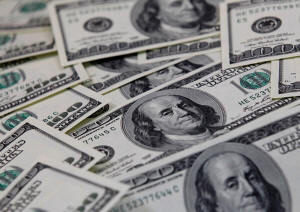Column: Micro-bubbles just reinforce cheap money - Mike Dolan
 Send a link to a friend
Send a link to a friend
 [January 30, 2021] By
Mike Dolan [January 30, 2021] By
Mike Dolan
LONDON (Reuters) - While everyone was
watching the hullabaloo over GameStop and the related short selling pain
this week, 10-year U.S. Treasury borrowing costs reversed briefly back
below 1% - underlining why stocks are at such lofty levels in the first
place.
The pandemic is far from over. Central banks are going nowhere.
Government spending will ramp up again sooner rather than later and a
vaccine-led recovery later this year is still seen as the most likely
outcome - even if delayed and messier than thought a month ago. Digital
and clean energy mega-trends roll on regardless.
That's been the thinking for months behind record high stocks. And it's
not really been changed much by the frenzied game of cat-and-mouse in
single stocks across trading apps, message boards and Wall St screens
this week.
The question is whether this behaviour is a sign of wider excess with
fallout elsewhere.

There may well be ripple effects from the explosion in the bombed-out
stock prices of ailing firms - ironically many of them 'losers' in the
digital disruption that's driven the tech stock rally of recent years.
Hedge fund losses from coordinated short squeezes by mostly semi-amateur
online traders have raised some fear of selling in other areas to recoup
losses, or distress seeping elsewhere.
JPMorgan warned of dangerous precedents in this targeted herd trading
sparking what they call fragility events - or "a feedback loop between
liquidity, volatility and investor flows" - in dozens of other stocks
with similar short interest and options market characteristics.
But so far the broad effect has been to lift already elevated stock
market volatility, buoy implied risk in equity and the cost of hedging
what are already considered expensive stocks. The VIX index of S&P500
implied volatility popped fleetingly above 30% on Wednesday for the
first time since just before the U.S. election.
That in itself cools investor demand - even if it arguably also keeps
overall exposure in check, and hence measures of aggregate equity
holdings to swollen cash liquidity well below previous bubble levels.
But it doesn't appear to change much about why equity markets are where
they are. Above-average volatility levels on their own were not enough
prevent the market setting records for the final four months of last
year.
The growth of margin debt has been a concern, as TS Lombard's Oliver
Brennan points out, but less so when measured against the ultra-low cost
of borrowing.
And despite the biggest one-day S&P500 drop since October on Wednesday,
there was no obvious dash for safe havens or even outsize directional
bias in otherwise frenetic options market activity.
DAMNED IF IT DOES...
Unless investors think the Federal Reserve or other central banks see
this market 'fragility' as dangerous speculative froth that urgently
requires removal of the fabled monetary punchbowl, the big picture is
unlikely to change.
For one, Fed chief Jerome Powell seemed less than convinced what was
happening on Reddit boards and Robinhood-type apps was anything to do
with the central bank, appearing to give the whole issue a bodyswerve on
Wednesday.
[to top of second column] |

U.S. one hundred dollar notes are seen in this picture illustration
taken in Seoul February 7, 2011. REUTERS/Lee Jae-Won

Powell stressed - as central banks around the world have insisted for decades -
that asset prices were not part of the Fed's monetary policy mandate and
probably shouldn't be either. He added that the link between low borrowing costs
and stock prices was weaker than most people thought.
"If you raise interest rates and thereby tighten financial conditions and reduce
economic activity in order to address asset bubbles and things like that, will
that even help? Will it actually cause more damage?" Powell said, adding that
the Fed relies on 'macroprudential' tools when it comes to financial stability.
And for that reason the Fed is always damned if it does and damned if doesn't in
moments of crisis. Whatever it may recommend about stock exposure and limits -
or whatever other regulators or tax authorities may opt to do to address the
chaos - the central bank is unlikely to change that monetary priority in the
middle of a pandemic.
Of course, that conclusion just rattles the cage of long-standing market bears
who blame central banks for boosting liquidity into every stock market wobble
for decades, underwriting market risk taking and stoking one of the biggest
bubbles in history even in the country's biggest downturn since World War Two.
For them, the single stock frenzy is just another symptom.
"Extreme speculative excess is all too apparent," wrote Societe Generale
strategist Albert Edwards on Thursday. "The madness has now taken a novel twist
with a new warrior class of retail investor roaming the equity savannah."
"This farce is of the Fed's creation," he said, adding it should "hang its head
in shame."

Others try to read deeper meaning into organised online trading campaigns - some
see a generational battle between unaffiliated millennials angry at years of
Wall St excess while their generation lost out during a decade of slow growth
alongside easy money and high asset prices. Others talk of a victory for the 'democratisation'
of markets against a closed cartel of big banks, brokers and funds.
All that said, shifting the profits from one side of Wall St to another hardly
seems to even things out - as BlackRock's reported windfall from the GameStop
surge attests.
And yet, GameStop aside, a record high stock market along with deepening
inequality has many economists worried that the "Roaring '20s" ahead may ape the
barely-masked iniquities of the 1920s - and threaten similar results.
"The pandemic has shone a spotlight on the inequalities of vulnerability that
permeate western societies," said HSBC economic advisor Stephen King. "From the
perspective of the 'left-behind' or the 'suddenly-vulnerable', a surging stock
market offers cold comfort."
What's certain is an unlikely move from the Fed to use monetary policy to stamp
out speculative excess just now would bamboozle Wall St's two biggest shorts -
those against the U.S. dollar and Treasury bonds. And problems there are of a
whole different order.
(by Mike Dolan, Twitter: @reutersMikeD. Chart by Saikat Chatterjee; Editing by
Kirsten Donovan)
[© 2021 Thomson Reuters. All rights
reserved.] Copyright 2021 Reuters. All rights reserved. This material may not be published,
broadcast, rewritten or redistributed.
Thompson Reuters is solely responsible for this content. |